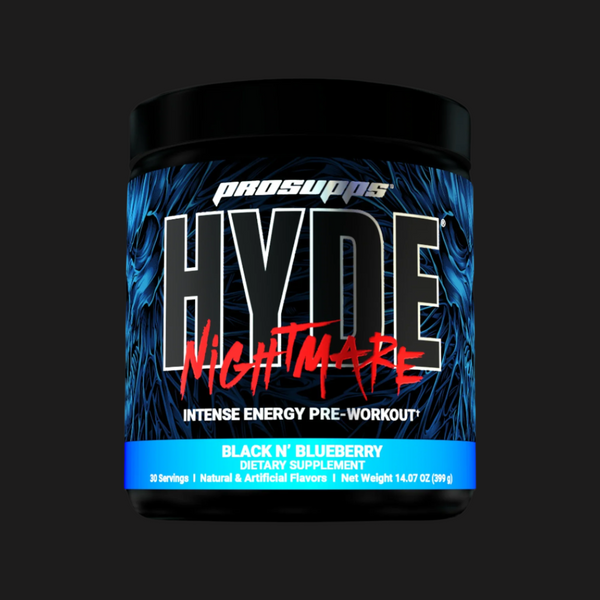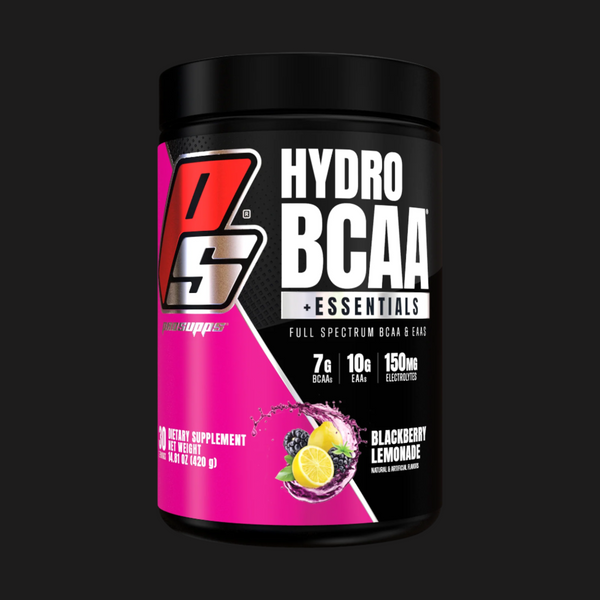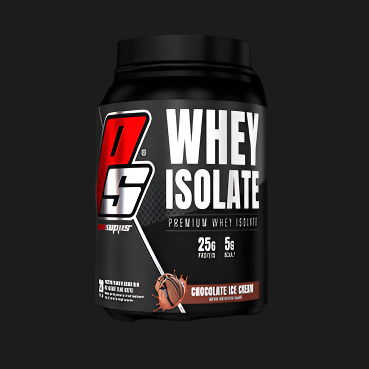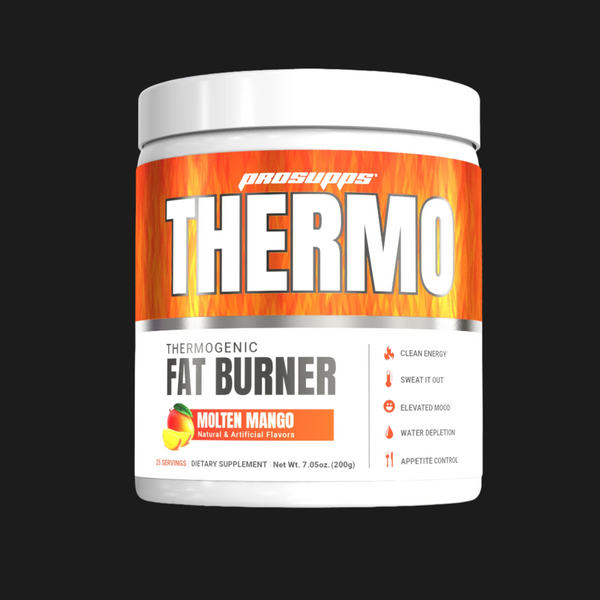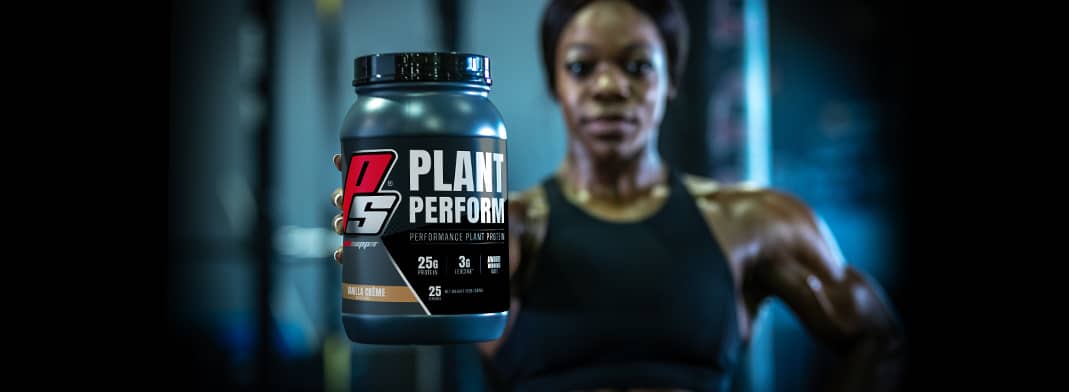
Plant Protein Guide
 Written by Guy Gustafson
Written by Guy Gustafson November 16, 2020
Over the last few years, people throughout the United States (and the rest of the world) have started shifting toward eating a more plant-based diet. In fact, approximately 9.7 million Americans currently report eating plant-based.
Even those who haven’t decided to eschew animal products altogether are still making an effort to eat more plants. This includes taking in more plant-based sources of protein.
Plant proteins are definitely misunderstood, especially in the fitness world. A lot of athletes and gym-goers assume you must consume whey protein in order to build muscle, improve performance, and maximize your results. This definitely isn’t the case, though, and we’re here to set the record straight.
Outlined below is your ultimate plant protein guide. Read on to find answers here to all your most pressing questions about plant-based protein powder, as well as plant-based protein sources in general.
Plant-Based Protein: The Basics
A common criticism of vegan and vegetarian diets is that they are too low in protein.
It’s true that some vegans and vegetarians do not get a sufficient amount of protein in their diet. Contrary to popular belief, though, these diets aren’t inherently protein-deficient.
There are many plant-based sources of protein that one can incorporate into their meals, including the following:
- Peas (9 grams of protein per cup)
- Brown Rice (5 grams of protein per cup)
- Fava Beans (10 grams of protein per cup)
- Lentils (18 grams of protein per cup)
- Hemp (11 grams of protein per 30 grams of hemp seeds)
- Quinoa (8 grams of protein per cup)
- Soybeans (29 grams of protein per cup)
Clearly, there are plenty of options besides chicken breast, egg whites, and whey protein powder that you can turn to in order to meet your daily protein goal.
Complete vs Incomplete Proteins
Those who are wary of plant-based diets also criticize plant protein sources because of the fact that many of them are not considered to be complete proteins.
To be classified as a complete protein, a food must contain all nine essential amino acids (or EAAs). These are amino acids that the body cannot make itself and must receive from food in order to function properly. The nine EAAs are:
- Lysine
- Histidine
- Methionine
- Threonine
- Tryptophan
- Phenylalanine
- Leucine
- Isoleucine
- Valine
These last three amino acids (leucine, isoleucine, and valine) are also referred to as branched-chain amino acids. They play an important role in muscle protein synthesis, specifically. Many gym-goers supplement with them to speed up their recovery and prevent muscle breakdown.
The majority of plant-based proteins do not contain all nine essential amino acids, while animal-based protein sources like meat and eggs do. However, there are some plant proteins that are considered complete, including quinoa, soybeans, and peas.
Plant proteins can also be combined to become complete. A common example of this is the combination of brown rice and black beans. When served together, their amino acid profiles complement each other and create a complete protein source.

How Much Protein Do You Really Need?
Some people who are hesitant about plant-based diets and their protein content are actually overestimating how much protein a person needs to feel and perform to the best of their abilities. If you stop and ask them what general protein requirements are for the average person, they might not even be able to tell you.
So, how much protein do you need to consume each day? It’s recommended that protein intake falls somewhere between 0.8 and 2.4 grams per kilogram of bodyweight. For a 150 pound person, this could range from 54 grams all the way up to 163 grams of protein per day based on your activity level.
Factoring in how active you are throughout the day, as well as how much dedicated exercise you do, is essential to calculate your ideal protein intake. For folks who are sedentary, the minimum recommendation of 0.8 grams of protein per kilogram is enough to keep you alive and your body functioning properly.
For an active individual, on the other hand, it’s best to shoot closer to the 1.2-2.4 grams per kilogram range. Since you’re placing more demands on your body, it makes sense that you will need more protein and more amino acids to repair itself and carry out other necessary processes.
Do Plant-Based Eaters Need More Protein?
Research shows that folks who eat plant-based diets and don’t get at least 10 percent of their protein from animal-based sources need a little more protein than their omnivorous counterparts.
This increased need has to do with differences in digestibility and absorption between plant and animal-based protein sources. Don’t panic, though, because the difference is nominal.
The bare minimum protein recommendation for plant-based individuals is 1 gram of protein per kilogram of body weight (compared to 0.8 for omnivores). That’s not too much of a difference, right? For a 150-pound person, that would look like 68 grams of protein instead of 54, or another cup of lentils at lunch.
For an active individual, the difference is a little more pronounced (1.4-2.2 grams per kilogram of body weight instead of 1.2-2.2 for omnivores). It’s still doable, though, especially if you supplement with high-quality plant-based protein powder.
Benefits of Plant-Based Protein Powder
In addition to getting protein from whole food plant-based protein sources, there are plenty of plant-based protein powders available these days. You can use these supplements to fill in (or, well, supplement) the gaps in your diet and make sure you’re meeting your daily protein needs.
Plant-based protein powders are often made from a combination of protein sources to ensure a satisfactory amino acid profile and provide consumers with the most nutritional bang for their buck.
Are you on the fence about using a plant-based protein supplement? Are you unsure of why you should use this type of protein powder over your typical whey protein shake?
Outlined below are some of the most noteworthy benefits that plant-based powders have to offer:
Meet Your Protein Goals Without Animal Products
Even though the availability of vegan-friendly options in stores and restaurants has increased worldwide, it can still be hard for some folks who eat a plant-based diet to meet their daily protein goals. This is especially true if they’re busy and don’t have a lot of time to prepare food at home.
Plant-based protein powder is the ultimate convenience food. It can make it much easier for vegans, vegetarians, and others who don’t want to consume animal-based protein to round out their diet and avoid any of the negative health effects associated with eating too little protein (muscle loss, diminished hair and skin health, decreased bone density, etc.).
Avoid Dairy-Related Health Problems
Some people steer clear of whey protein powder (and other dairy-based protein powders) because they are lactose intolerant or have milk allergies. If this is the case for you, the last thing you want to do after a tough workout is to chug a milk product-filled protein shake, right?
For those who are lactose intolerant or allergic to milk, dairy-based protein powders can have serious negative side effects. These include stomach upset, nausea, vomiting, and diarrhea. Beyond digestive issues, you might also experience other symptoms after consuming dairy products, such as acne flare-ups.
Plant-based protein powder helps you to avoid all of these unpleasant effects without sacrificing your daily protein needs.
Stay Fuller Longer
When compared to animal-based sources of protein, plant protein definitely wins in the fiber department. Most plant proteins contain more fiber than other, animal-based protein sources, which can make them much more satiating.
If you’re using a protein shake as a meal replacement, or if you just want to enjoy a post-workout snack that will keep you full until your next meal, plant-based protein powder might be a better option to consider. The extra fiber will help you to stay full and make it easier for you to avoid pulling into the drive-through at the last minute.
Improve Gut Health
Plant-based protein powders (and other protein sources for that matter) can also be good for the health of your digestive tract, also known as the gut.
The digestive tract is full of bacteria that help you to break down and digest your food, and the health of your gut also plays an important role in keeping the rest of your body healthy. Imbalances in bacteria can lead to all kinds of health issues, from depression and anxiety to joint pain and weight gain.
One way to boost your gut health is to make sure you’re getting enough fiber in your diet. By supplementing with a protein powder that contains additional fiber, you can meet your daily needs (around 25 grams is recommended for most people) with ease.
Consuming more plants and getting nutrients from a variety of sources is also good for your gut. When you take in different types of foods, you can diversify the bacteria in your gut and create a more balanced microbiome.
Get Other Vitamins and Minerals
Many plant-based protein powders also contain essential minerals and nutrients that other protein powders do not.
For example, many powders contain iron, which supports the immune system, regulates body temperatures, and improves your energy levels and ability to focus. Other nutrients that are often found in plant-based powders include zinc, magnesium, calcium, and omega-3 fatty acids.
If you know or suspect that there are other nutritional gaps in your diet, beyond insufficient protein, high-quality plant-based protein powder might make up for potential deficits. It can also help you to ensure you’re getting everything your body needs to feel its best in and out of the gym.

What to Look for in Plant-Based Protein Powder
If these benefits sound good to you and in line with your goals, you might be itching to hop online or run to your nearest health food store and pick up a plant-based protein powder to add to your next shake. Before you rush off, though, take a moment to read up on the most important factors to consider when shopping for a plant-based powder.
As with any protein supplement, there are significant differences in the quality, taste, and nutrient composition of different plant-based proteins. If you take the time to research, you’ll have a much easier time finding a great protein, and you won’t end up with a giant tub of a subpar product gathering dust in your pantry.
The following are some of the most important factors to consider when you’re looking for a good plant-based protein supplement:
Check the Protein Source (or Sources)
First, and most importantly, find out where the protein in your plant-based protein powder is coming from. Is it a pea protein? Brown rice protein? A blend of several different plant sources?
Knowing which protein sources the manufacturer used when making the product will help you to decide if it’s a good option for you. You’ll have a better understanding of the powder’s nutrient profile, and you’ll be able to avoid any ingredients that might be problematic to you, specifically. For example, if you have an allergy to soy, you’ll of course want to steer clear of any soy-based protein powders.
Be wary of any powders that don’t have their specific ingredients listed on the back of the package. This is a dubious practice that some supplement makers like to use, and it could result in you supplementing with a less-than-ideal product.
Look at the Rest of the Ingredients List
Beyond the protein sources, it’s important to pay attention to the other ingredients included in your protein supplement of choice. What else does the manufacturer use to flavor their protein and increase its nutrient density?
Do they use sugar? What about fillers or potentially problematic ingredients like gluten? Do they add additional vitamins, minerals, and amino acids to make it more conducive to muscle building and recovery?
Everyone’s ingredient needs and preferences are different, so be sure to consider your particular needs and look for a powder that aligns with them. If you don’t consume gluten, for example, make sure you get a powder that is labeled gluten-free.
Review the Nutrition Label
Before you start incorporating any type of supplement into your routine, it’s a good idea to look at the nutrition label. How many grams of protein does the powder you’re thinking about purchasing contain?
As a general rule, it’s best to look for powders that contain about 20 grams of protein per scoop. Some plant-based products contain less than this, so be sure to double-check before you buy one.
In addition to making sure it hits the 20 grams of protein per serving mark, take a look at the number of grams of carbohydrates and fats found in each scoop of protein powder, too.
This will help you ensure you’re buying a protein powder that aligns with all of your macronutrient goals, not just your required protein intake. For example, if you’re following a low carb or ketogenic diet, you might not want to buy a powder that contains lots of carbohydrates, even if it does meet your protein needs.
Consider the Amino Acid Profile
In addition to the macronutrient breakdown, take a look at the amino acid profile of your protein powder, too.
Is it a complete protein? Does it contain all of the essential amino acids that your body needs? What about branched-chain amino acids? Does it contain Leucine, Isoleucine, and Valine?
You might also want to consider a protein powder that contains added leucine. This is an especially good thing to do if you’re concerned about muscle building, recovery, and performance.
Of the three branched-chain amino acids, leucine is the most important for muscle protein synthesis. If you use a protein powder that contains added leucine, you can help to make up for other plant-based proteins you might eat throughout the day that don’t contain this important amino acid.
Ask About Laboratory Testing
As with any supplement, be sure to look into whether or not a particular protein powder is lab-tested before you buy it.
The most reputable supplement manufacturers will take the time (and spend the money) to have their products tested and ensure they’re safe, of high quality, and contain everything that the label says they contain. If a product isn’t tested for safety and purity, that’s a red flag.
In the case of plant-based protein powders, it’s also important to look into testing for heavy metals. Remember, plants can absorb heavy metals from the soil. These heavy metals can then make their way into your protein powder if the manufacturer isn’t careful.

Introducing ProSupps® Plant Perform
When the members of our Squad started to reach out to us about creating our own plant-based supplement, we did a deep dive into the different powders being sold in stores and online. We also found that a lot of them were lacking.
Many didn’t have the kind of superior nutrition profile that we strive for when creating any supplement. They also didn’t taste very good or mix very well with water, which is not ideal for busy gym-goers who often find themselves trying to make their shakes while on the go.
Once we got a clear idea of what was on the market, we got to work creating our own product that solved all of the problems associated with the typical plant-based protein supplement. After lots of time in the lab, ProSupps® Plant Perform was born.
What Is Plant Perform?
Plant Perform is ProSupps®’ first-ever 100 percent vegan protein powder. It’s designed with athletic performance in mind and is the perfect solution for any plant-based gym-goer who wants to enjoy a vegan protein powder after their workout but doesn’t want to sacrifice taste or results.
Who Is Plant Perform For?
Plant Perform is for any athlete who doesn’t want to consume dairy or animal-based protein powder. This includes vegans, vegetarians, and people who are lactose-intolerant and can’t handle dairy. Plant Perform is a great option for just about anyone to add to their post-workout supplement stack (or to enjoy any time of day when a protein boost is needed).
Remember, you don’t have to sacrifice your gains or workout performance just because you’re eating a plant-based diet. Plant Perform is designed to meet athletes’ needs and help them maximize their results, no animal products required.
What Makes Plant Perform Special?
As we mentioned above, we were unimpressed with the other plant-based protein supplements we tested when formulating Plant Perform. We knew we wanted to create something that stood apart from the pack, and that’s exactly what we did with our newest protein powder.
Extra Leucine
Plant Perform features 3 grams of leucine per serving. With the addition of this important amino acid, you can rest assured that you’re getting everything your body needs to build muscle, recovery optimally, and see results.
High in Protein
This protein powder also contains a whopping 24-25 grams of protein per scoop. You’ll have no trouble meeting your protein goals when you add Plant Perform to your daily regimen.
Great Taste and Texture
Long gone are the days of grainy, bitter plant-based protein shakes that taste like the dirt in which the plants were grown. PLant Perform features our proprietary Flavor Smooth™ technology, which allows you to enjoy a creamy, rich taste, just like the milkshakes you loved as a kid, but with all the benefits of plant-based protein.
Optimal Protein Blend
Because it’s 100 percent vegan and dairy-free, Plant Perform won’t cause any stomach upset, unlike whey protein. It’s made with a combination of pea, brown rice, and fava bean protein and is loaded with beneficial nutrients (in addition to protein).
Pea protein features triple the arginine (another important amino acid for muscle building) found in whey protein, and brown rice protein contains antioxidants, B vitamins, and fiber. Fava bean protein is another good fiber source, and it also contains beneficial minerals like manganese and copper.
With these three protein sources in play, Plant Perform is a true nutrient powerhouse.
Try ProSupps® Plant-Based Protein Powder Today
As you can see, there are lots of reasons to consider incorporating a high-quality plant-based protein powder, such as ProSupps Plant Perform, into your supplement regimen.
It doesn’t matter if you eat a 100 percent vegan diet or if you just want a dairy-free protein powder that won’t upset your stomach. Either way, Plant Perform is the perfect solution that tastes delicious and will help you continue making progress toward your fitness goals.
Order Plant Perform today through our online store and try for yourself, or use our store locator to find it at a retailer near you.
GET LEAN
 Why You're Struggling
Can't Lean Out? Here's Why You're Struggling
Why You're Struggling
Can't Lean Out? Here's Why You're Struggling
We all know the feeling. You’ve been working hard in the gym, sticking to your diet and getting in your...
 Weight Loss
Choosing the Best Protein Powder for Weight Loss
Weight Loss
Choosing the Best Protein Powder for Weight Loss
Struggling to shed body fat and lean out? You might need to focus more on your nutrition, specifically your protein...
 Weight Loss
9 Ways to Speed Up Your Weight Loss and Burn More Fat
Weight Loss
9 Ways to Speed Up Your Weight Loss and Burn More Fat
Weight loss is a major goal for more than 40 percent of Americans. Is it something you’re working toward, too?
 Workout Routine
10 Tips for Building a Sustainable Workout Routine
Workout Routine
10 Tips for Building a Sustainable Workout Routine
Starting a fitness journey is an exciting time, but maintaining a sustainable workout routine can be challenging. From setting realistic...





